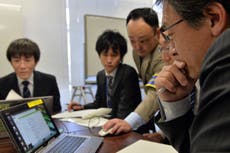CAS decision on Russia’s doping ban must be ‘unambiguous’ to be put in place before Tokyo Olympics, says IOC
Nation was sanctioned when WADA concluded that fake evidence had been planted and files relating to positive doping tests had been deleted from laboratory data
Any decision by the Court of Arbitration for Sport (CAS) on Russia’s appeal of a four-year doping ban must be totally clear so it can be implemented before next year’s Tokyo Olympics, the International Olympic Committee (IOC)’s president has said.
Last year, Russia was sanctioned when the World Anti-Doping Agency (WADA) concluded that Moscow had planted fake evidence and deleted files relating to positive doping tests in laboratory data that could have helped with the identification of drug cheats.
Russia has appealed to CAS, which heard the case last week. A verdict is expected before the end of the year.
“In the hearing our representatives have repeated the call of the IOC to have a clear and unambiguous decision which can be directly implemented and which does not need any interpretation and would not trigger new court cases and CAS procedures,” IOC President Thomas Bach said.
Read more: NBA season cut short to allow stars to participate at Tokyo Olympics
The case against Russia started with a 2015 report commissioned by WADA that found evidence of mass doping among track and field athletes.
“We have been informed that the [CAS] panel indicated the decision can be expected before the end of the year,” Bach said in a virtual news conference at the end of the IOC Executive Board meeting.
“This was very good news for everybody, because it would create some certainty seven months before the Tokyo Games.”
The Tokyo Olympics are due to begin in July 2021, having been delayed by a year due to the coronavirus pandemic.
Should the ban be upheld, Russia’s teams and athletes could only compete at major sporting events as neutral competitors without the country’s flag or national anthem.
Many of Russia’s athletes have missed the past two Olympics, and the country was stripped of its flag at the 2018 Pyeongchang Winter Games as punishment for state-sponsored doping at the 2014 Sochi Games.
Reuters
Join our commenting forum
Join thought-provoking conversations, follow other Independent readers and see their replies
Comments

Bookmark popover
Removed from bookmarks